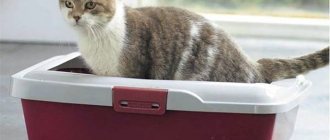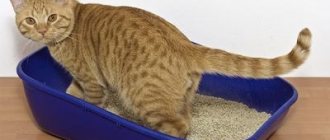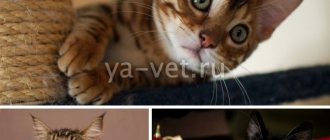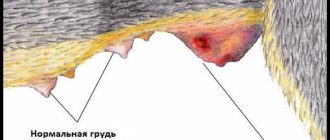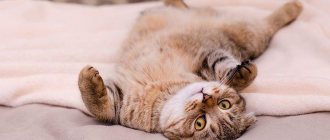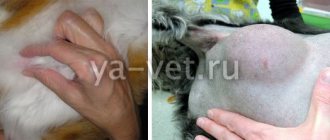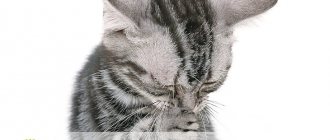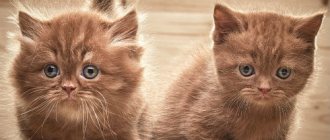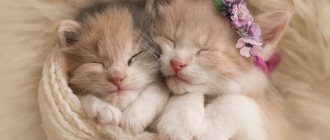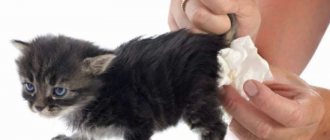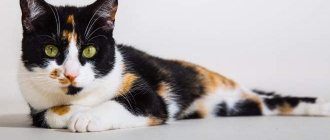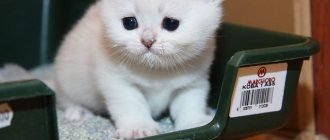There are several alarming symptoms in a mustachioed pet, in which the owner should at least pay attention to the cat’s health (or better yet, immediately contact a veterinary clinic). One of the most common symptoms in cats is diarrhea (another name is diarrhea). Murkoshi specialists will help you figure out why this occurs and how to prevent it.
1) Features of the course and possible consequences 2) Causes of diarrhea 3) What help to give a cat with diarrhea due to poisoning 4) When to consult a doctor 5) Treatment and prevention
Features of the course and possible consequences
In most cases, diarrhea in a kitten is not an independent disease, but a symptom of some other ailment. Diarrhea is the very rapid passage of eaten food through the gastrointestinal tract, causing frequent loose stools. Quite often, diarrhea is accompanied by abdominal pain. With normal functioning of the gastrointestinal tract (and the body as a whole), the cat defecates once a day, maximum 2 times. There is no mucus, blood or undigested food in the feces. In the case of diarrhea, the cat may have bowel movements up to 10 times a day; the stool may be liquid or mushy, with a strong odor, often with mucus, and sometimes with blood. Don’t think that diarrhea is an unpleasant, but normal, everyday “trifle.” In some cases, diarrhea in a kitten may indicate a serious illness, which, if left untreated, can even lead to death. In addition, diarrhea itself leads to dehydration, which is extremely dangerous, especially for kittens (since their body does not yet have sufficient reserves).
When does cat diarrhea require veterinary attention?
Assess the severity of your cat's diarrhea and her overall condition when trying to decide whether she should see a veterinarian. If your cat has relatively mild diarrhea, isn't vomiting, is eating and drinking, and doesn't seem to be feeling too ill, it's wise to try home treatment.
If your cat's condition describes any of the following, contact your veterinarian immediately:
- Your cat is very young, very old, or has a serious health problem that may make her vulnerable to the effects of dehydration.
- Your cat is vomiting, lethargic, depressed, in pain, or has other worrying symptoms.
- Diarrhea may be profuse, watery, explosive, or very frequent.
- The diarrhea contains blood or is dark and tarry.
Causes of diarrhea
Let's look at the most common reasons that lead to diarrhea in a cat:
1. Feeding food from a human table
Such nutrition cannot be called correct. There are some foods that we often use that cats cannot digest by definition, such as milk. However, with this method of feeding, the cat does not receive (or receives insufficient amounts) many vitamins, minerals and nutrients. With an unbalanced diet, cats' digestion is upset, resulting in diarrhea and other manifestations of disorders in the body. With properly selected ready-made food, such problems are eliminated.
Read about proper nutrition: Proper nutrition for cats
2. Poisoning
The cat stole something from the table or its food has spoiled due to improper storage. The staff of the Murkosha shelter reminds that a portion of dry food should not lie in a bowl for more than a day, and any remaining wet food should be removed immediately. In addition, the cat can be poisoned by toxic substances: heavy metals, household chemicals, medications - all this also causes diarrhea.
3. A sudden change in diet
You need to switch to a new food gradually, over several days - a week if the animal is an adult, and 14-15 days in the case of kittens. When picking up a pet from a shelter, nursery, or other owners, check in advance what kind of food he is used to. The first time in a new place, the diet should remain the same. When adopting a cat from the street, keep in mind that its body will need time to adapt to a balanced diet.
4. Internal parasites (worms and protozoa)
Worms infect the mucous membranes of various organs of the cat and live off their tissues and blood. Any parasites that infect an animal release substances during their life processes that can cause poisoning. In no case should you ignore this problem - in addition to a general decrease in immunity, everything can end with intestinal rupture, and this can be fatal.
Read more about parasites: Worms in cats: symptoms and treatment
5. Antibiotics
In some cases, taking antibiotics can cause diarrhea as a result of changes in intestinal microflora. Consult your veterinarian for treatment adjustments.
6. Panleukopenia
Symptoms: bloody diarrhea, black feces. See a doctor urgently! This is a dangerous infection with a high mortality rate. Volunteers of the Murkosha shelter draw your attention to the fact that the virus can easily be brought on shoes from the street, so it is extremely important to vaccinate cats not only against rabies, but also against other serious infections.
More about the disease: What is panleukopenia in cats
7. Feline coronavirus
Symptoms are associated with disruption of the gastrointestinal tract: diarrhea, loose or soft stools. They can appear once or periodically, becoming chronic. Get tested to detect the virus in your cat’s body and consult with your doctor about further actions.
Read about coronavirus: Symptoms and treatment of feline coronavirus
8. Intestinal diseases (for example, colitis)
Colitis is an inflammation of the large intestine, which is accompanied by disruption of the digestive process. It is the lower part of the digestive tract (large intestine) that is responsible for the absorption of water and the formation of feces, so it is very important to identify this disease as early as possible and begin treatment to avoid serious consequences.
Read more about the disease: Symptoms and treatment of colitis in cats
9. Features of children's digestion
Small kittens have liquid stools by definition. But you should closely monitor the manifestation of the following signs: a greenish tint to the stool, a sharp sour odor, bloating - then you need to seek help from a veterinarian. And in the case of kittens, delay is extremely dangerous.
10. Other reasons
Diarrhea itself is not a specific symptom, so there can be many reasons for its occurrence - from liver problems and vitamin deficiency to infection with various viruses, bacteria and protozoa. Above are just the most common of them.
How to properly feed a cat if it has diarrhea
80% of owners experience diarrhea in their pets. Main reasons:
● Infectious diseases.
● Helminths and protozoa.
● Poisoning.
● Inflammatory bowel diseases.
● Diseases of other organs of the digestive system.
If diarrhea is caused by these problems or its etiology is not exactly clear, then you need to contact a veterinary gastroenterologist for diagnosis and treatment.
For diarrhea associated with overeating, eating stale food or food not intended for the cat, stool can be normalized using a therapeutic diet, which must be maintained for an average of 14 days.
During diarrhea, normal absorption of fluid in the intestines is disrupted, most of it comes out with feces. The owner must adjust his cat's diet so that the food is easily digestible and does not irritate the already inflamed walls of the digestive tract. It is also important to avoid dehydration, as it can occur very quickly.
If a cat has a decreased appetite, then there is no need for force feeding on the first day. It is important to provide your pet with enough moisture by placing several bowls of water around the house. If you completely refuse to drink, it is necessary to forcefully inject liquid from a syringe without a needle into the corner of the mouth.
A starvation diet for more than a day is dangerous for cats, as serious changes in the liver can begin - lipidosis.
● On the second day, food should be offered every 2 hours, but in small portions, 1-2 spoons.
● Raw foods are contraindicated during this period. Food must be boiled or steamed. It is impossible to give fried, spicy, salty food, it irritates the walls of the stomach and intestines. For convenience and ease of digestion, food is pureed. Access to clean, fresh water should not be limited.
● Additionally, you can add Viyo nutritious drink to your diet, which is rich in prebiotic fiber.
● To improve a cat’s appetite and increase its palatability, the pet should be offered food heated to approximately 37 degrees. It is more fragrant and attracts the cat.
● If your pet eats industrially produced food, then it needs to be temporarily switched to medicated food, which is better absorbed and helps the digestive system recover faster.
Diarrhea can occur due to intolerance to food components or due to an individual reaction to certain foods. The owner should analyze his cat's diet over the past 3-5 days and exclude anything new. Also, you should not suddenly switch your pet from one type of food to another; the transition should be smooth.
If diarrhea occurs, you need to return to your usual diet.
How to help a cat with diarrhea due to poisoning
Diarrhea inevitably leads to dehydration, so the first aid in this case is to drink plenty of fluids. Water will help remove toxins from the body more effectively and quickly. If the cat does not drink from the bowl himself, give him water from a clean syringe without a needle. The easiest way to do this is to insert the nozzle of the syringe between the side teeth. Then you won’t even have to open the animal’s mouth. Pour water in small doses, waiting until the previous one is swallowed. This is heard by a characteristic sound and visible by movement in the throat area. You can stroke the cat on the chin and a little lower, talking to it affectionately. The procedure is carried out as carefully as possible: there is no need to tightly restrain the cat, provoking stress and refusal to cooperate, and pour in a lot of water at once - the pet may choke. The second step is assistance in removing harmful substances from the gastrointestinal tract by administering sorbent drugs. In the case of cats, it is most convenient to use Enterosgel, which can be bought at a regular pharmacy (a useful first aid element for poisoning in a home first aid kit for people and animals). Dosage: ½ teaspoon for a kitten and 1 teaspoon for an adult cat once a day. The gel is diluted in water to a liquid state of approximately 1:1 and poured into the cat’s mouth. Then double the volume of water is poured in.
Natural products
Food is processed so that it is quickly digested. The meat is boiled, finely chopped or pureed in a blender, mixed with broth. It is useful to make lean minced meat and steam meatballs. Cereals and vegetables are boiled in water or meat broth, then pureed through a sieve.
For the first 3 days, the cat’s food is limited to dietary dishes, foods that irritate the gastrointestinal tract and provoke fermentation are excluded.
The table indicates permitted and forbidden foods:
| Can: | It is forbidden: |
|
|
On the 4th day, low-fat cottage cheese and boiled vegetables are gradually added: carrots, broccoli, cauliflower, pumpkin, zucchini. With diarrhea, the animal eats sluggishly, but it needs to be fed. Appetite is stimulated by attractive smells, and gravy from industrial liquid feed is added to food. If the cat completely refuses to eat, they are taken to a veterinary hospital, where a nutrient solution of glucose with ascorbic acid is injected intravenously. To restore the nervous system, injections of B vitamins are prescribed.
Medicines should not be given without a doctor's advice.
You can support the intestinal microflora without harm using folk remedies:
- Activated charcoal helps remove harmful bacteria from the intestines.
- A decoction of chamomile and St. John's wort reduces inflammation.
- An infusion of oak bark has an astringent effect.
Decoctions are given three times a day, 10 ml, charcoal - twice a day: half a tablet is crushed, mixed with a teaspoon of water and poured through a syringe.
When to see a doctor
For the following symptoms, you should not rely on self-medication:
- atypical color of stool - white, black, green, orange; - blood in the stool; - sharp sour smell; - bloating; - continuous diarrhea throughout the day; - chronic diarrhea with periodic manifestations; - severe poisoning; - general unsatisfactory condition: lack of appetite, weakness, inactivity, high temperature, vomiting, etc.
Perhaps the cat has a serious illness, and the lack of qualified help will only worsen his condition.
Main predisposing factors
The causes of diarrhea in kittens are extremely varied. This includes both simple stress (including weaning and moving to a new home) and very serious pathologies, including feline panleukopenia. Very often, diarrhea is a consequence of using low-quality feed.
Let's consider several situations in which a kitten's feces can turn greenish:
- Overfeeding.
- Cow's milk. The digestive tract of many kittens cannot digest it at all. In the lumen of the intestines, many casein clots form, which rot.
- Spoiled food.
- Changing your diet.
- Weaning from mother.
- Stress.
- Helminthiases.
- Protozoal infections. “Green” diarrhea is especially characteristic of giardiasis and cryptosporidiosis.
- Bacterial or viral infections (for example, infectious enteritis).
- Diabetes.
- Oncological diseases.
Treatment and prevention
Since diarrhea in a cat usually indicates poisoning or some kind of disease, it is the primary cause that is treated. The form of treatment depends on the disease causing the diarrhea and the condition of the animal. Antidotes, antibiotics, anthelmintics, etc. may be prescribed. Sometimes it is necessary to change the diet. The exact course of treatment will be determined by the veterinarian, who will also give recommendations on various aspects of caring for the animal. To prevent diarrhea in a kitten, we can recommend the following:
1. Balanced diet. The optimal choice is professional super-premium and holistic-class food, which already contains all the vitamins and minerals a cat needs. 2. Regular vaccination (once a year) and treatment against external and internal parasites (2 times a year).
Read more about the importance of vaccination: Vaccinations for cats - what, how, why?
3. Storing medications, household chemicals and other potentially dangerous substances out of the reach of a curious pet. 4. Preventive visits to the veterinarian at least once a year (for animals over 10 years old - at least 2 times a year).
If you are concerned about your pet's condition, be it diarrhea, vomiting, changes in habits or behavior, contact your veterinarian promptly. Perhaps nothing terrible happens to the animal, but this is exactly the case when it doesn’t hurt to have a safety net. Of course, you should reasonably trust the veterinarian (it is highly advisable that the cat has a permanent doctor who periodically observes it), and not run to the first clinic you come across. However, according to the experience of the Murkosha shelter, the sooner after the onset of symptoms you see a doctor, the better the help he can provide to your pet.
The cat has diarrhea and vomiting: what to do at home
When a cat only has diarrhea, she can be given a sorbent - Enterosgel, Phosphalugel, Smecta or analogues. The pet is monitored and most often the situation returns to normal on its own. You should not prescribe antimicrobial agents yourself, so as not to cause harm: the effect of medications on cats and humans is not the same.
In case of vomiting and diarrhea, stop feeding the pet, but do not limit its drinking. The duration of a fasting diet for a kitten is 12 hours, for an adult cat - a day or more. Pay attention to vomiting. In some cases, the cat does not drink, and forceful infusion of water causes vomiting.
In such cases, the primary task is to combat dehydration. With diarrhea and vomiting, fluid is lost, as well as electrolytes, which provide osmosis - the process of transferring water through semi-permeable membranes. The blood may thicken and form blood clots. The heart loses its ability to pump viscous blood, and the animal dies.
If a veterinary clinic is not available at this time, the pet is given fluids, electrolytes, and antivenom parenterally. Ringer-Locke solution is intended for drip infusion, but it can be given subcutaneously, up to 150 ml per medium-sized cat per day.
The cones that form quickly dissolve. If there is no improvement, call a veterinarian at home or take the cat to the clinic.
Other symptoms
In case of infection or disturbance of the intestinal microflora in kittens in the case of green diarrhea, the following phenomena may be observed:
- decreased activity, weakness, apathy;
- weight loss;
- when defecating, the pet may experience pain and discomfort;
- decreased appetite (up to complete refusal of food);
- temperature increase;
- increased thirst;
- dry mucous membranes;
- deterioration of coat condition.
You need to be wary of rapid development of diarrhea and high fever - this is a sign of bacterial infection, which is especially dangerous for small animals. It must be remembered that severe diarrhea leads to the loss of potassium and sodium salts. As a result of an imbalance in the body's water-salt balance, diarrhea and water loss intensify, which leads to severe dehydration.
How to help with diarrhea?
Only a veterinarian can prescribe specific antibiotic treatment for a kitten. But the owner himself can also help by giving the animal anti-diarrhea medications, as well as putting the kitten on a diet.
Diet
First, at home, it is recommended to completely limit the animal’s food intake. The fasting time depends on the age of the pet. An adult cat can easily withstand the absence of food for 24-40 hours, but a kitten - no more than 10-12 hours. Drinking water must always be available.
